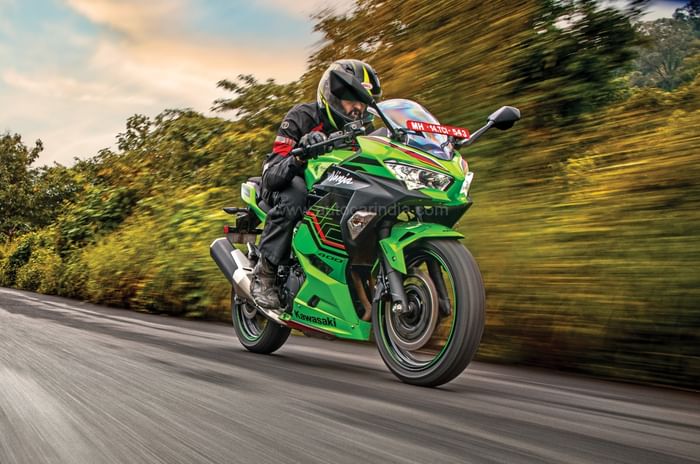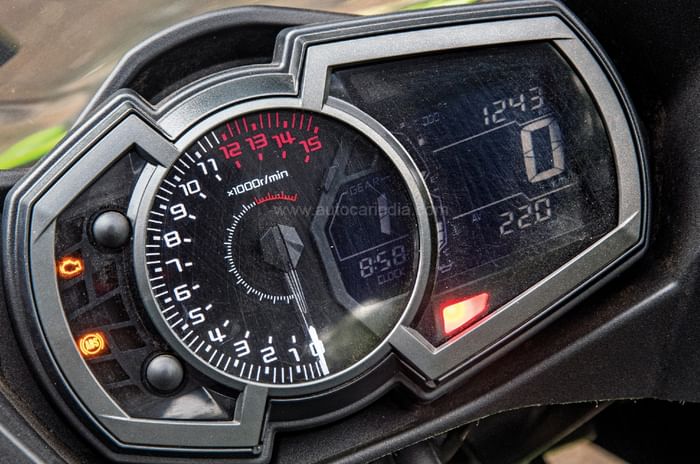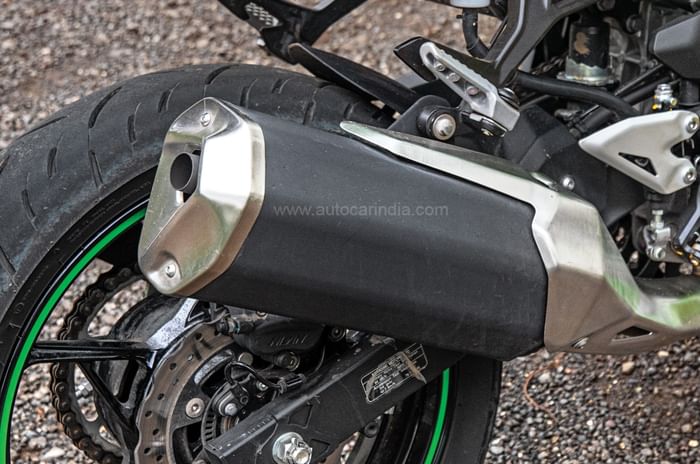2022 Kawasaki Ninja 400 review: Mean green machine
The Kawasaki Ninja 400 now gets a BS6-compliant engine and a new livery. We tell you what it's like.
Published on Oct 29, 2022 07:00:00 AM
49,305 Views
Follow us on

Cluster is simple, but looks good.

This is one sweet-sounding bike!
We Like
- Sharp design
- Performance,rideability
We Don't Like
- Exorbitant price
- Misses some features
After a hiatus of over two years, Kawasaki has decided to bring back the more modern and powerful Ninja 400 to India. The changes are incremental (largely a BS6-compliant engine), and we take it out for a spin to see what’s what.
Kawasaki Ninja 400: design and ergonomics
In true Ninja fashion, the 400 is one aggressive-looking motorcycle. Despite no changes made to the styling, the angular fairing with those twin-LED headlamps and the slim tail section with that attractive LED tail-lamp makes it look rather menacing. A big change for this model year is the adoption of a new livery, inspired by Kawasaki’s WSBK-spec ZX-10R. The bright green base colour together with the red and black touches and the KRT logos make it a head-turner for sure.

The riding position on the Ninja 400 is comfortable and it isn’t as committed as you would think given the way it looks. The 785mm seat height makes it approachable and there isn’t a long reach to the handlebars either. The foot pegs too are set at a reasonably comfortable angle; they are a bit high for my liking (I’m 5’11”), but they aren’t very rear-set, which is a good thing. The overall build quality and the switchgear feel good enough too.
Kawasaki Ninja 400: engine and performance
The Ninja 400 continues to be powered by the same 399cc parallel twin motor from the earlier version, but the transition to BS6 has led to a difference in output. Power is down 4hp, to 45hp, while torque is down 1Nm, to 37Nm. Despite that, the Ninja 400 continues to be the most powerful motorcycle in its class, albeit by just 1.5hp over the 390 KTMs.
As such, the BS6 Ninja 400 is faster than the KTM RC 390 in all aspects. In our performance tests, the Ninja managed to do 0-100kph in 5.25s, while the RC took 5.85s. The Kawasaki is also quicker in terms of in-gear acceleration. However, it’s worth noting that we tested the Ninja in dry conditions while the KTM was tested in the wet.

The engine itself is a very tractable unit that has a nice and meaty midrange. It’s refined too, with only some mild vibrations filtering through at higher rpms. Speaking of which, this engine really comes into its own near the top of the revband. It builds speed rapidly and sounds just so sweet, it’s addictive!
The smooth engine is complemented by a slip-and-assist clutch that feels seamless in its operation. Lever action is light, and it’s a breeze to operate even in traffic. The gearbox itself is a slick-shifting 6-speed unit but misses out on a quickshifter, which some competitors offer.
Kawasaki Ninja 400: ride and handling
Another area where the Ninja 400 impresses is its corner-carving ability. There’s nothing new in terms of hardware – it continues with the same trellis frame, suspension set-up and Dunlop tyres as before, but that’s no bad thing. The 400 feels light and agile on its feet and it doesn’t take much effort to tip into corners. And once you’re in there, it feels very stable, which inspires confidence. The grip from the Dunlops is just about adequate, but they offer little feedback and this chassis deserves better tyres.
As for the suspension, it continues to run a non-adjustable telescopic fork and a preload-adjustable monoshock. And while there’s nothing to complain about, it would have been nice to see a modern upside-down fork on the 400, especially as its main competitors feature that. The ride quality in general is good as it feels quite compliant with most of our road conditions. Only the sharper bumps and larger potholes filter through and even then it isn’t uncomfortable.
In terms of braking, the Ninja 400 comes to a dead stop from 60kph in an impressive 17.13m. It lacks some bite initially, but it has more than ample stopping power on offer.
Now, equipment is an area where the new Ninja 400 falls short. You do get LED headlights, a slip-and-assist clutch, dual-channel ABS and a semi-digital instrument cluster with an analogue tacho, which looks quite cool. But given its positioning in the market, it should have been equipped so much better. There’s no traction control, adjustable levers, TFT display or Bluetooth connectivity, which is expected at this price in 2022.
Kawasaki Ninja 400: should you buy it?
In conclusion, there’s a lot to like about the Ninja 400. It’s got the looks, a refined and sweet-sounding motor, and a sharp chassis. But there’s no getting around the gigantic elephant in the room – its price tag.
.jpg?w=700&c=0)
Priced at Rs 4.99 lakh (ex-showroom), the Ninja 400 costs Rs 1.83 lakh more than the better-equipped KTM RC 390 and a massive Rs 2.34 lakh more than the value-for-money TVS Apache RR 310. In fact, because it is a CBU import, the Ninja attracts higher taxation in certain states. For example, it costs Rs 6.80 lakh on road in Mumbai, and for that much you can get two Apache RR 310s. And no, this Kawasaki is not twice the bike the TVS is.
So unless Kawasaki manages to cut prices drastically or bring in some level of localisation, the Ninja 400, as before, remains a very sweet motorcycle, but one that makes very little sense.
Tech Specs 
Copyright (c) Autocar India. All rights reserved.


 Dimensions & Chassis
Dimensions & Chassis Price
Price Engine
Engine Transmission
Transmission Braking
Braking Acceleration
Acceleration Suspension
Suspension Brakes
Brakes
Comments
Member Login
Personal Details
No comments yet. Be the first to comment.